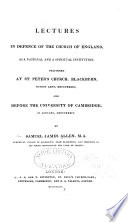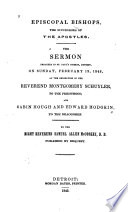 | William Linn - Episcopacy - 1806 - 232 pages
...times. And had the Apostles known any hidden mysteries which they imparted to none but the perfect (as the hereticks pretend), they would have committed...for they desired to have those in all things perfect and unreprovable, whom they left to be their successors, and to whom they committed their own afiostolic... | |
 | Samuel James Allen - Lenten sermons - 1834 - 478 pages
...Translation of the Apostolic Fathers. Camb. 1833. they imparted to none but the perfect, (as the heretics pretend,) they would have committed them to those...for they desired to have those in all things perfect and unreprovable, whom they left to be their successors, and to whom they committed their own apostolic... | |
 | Samuel Allen McCoskry - Apostolic succession - 1842 - 384 pages
...mysteries, which they imparted to none but the perfect, (as heretics pretend,) they would have submitted them to those men, to whom they committed the churches themselves ; for they desired to have those in 011 things perfect and unreproveable, whom they left to be their successors, and to whom they committed... | |
 | Samuel Allen McCoskry - Apostolic succession - 1842 - 384 pages
...the Apostles known any hidden mysteries which they imparted to none but the perfect, (as the heretics pretend,) they would have committed them to those...men, to whom they committed the Churches themselves j .for they desired to have those in all things perfect and unreprovable, whom they left to be ihcir... | |
 | Edward Lewes Cutts - 1887 - 702 pages
...down to our own times. And had the apostles known any hidden mysteries (as the heretics pretended), they would have committed them to those men to whom...the Churches themselves ; for they desired to have them in all respects perfect and unreprovable whom they left to be their successors, and to whom they... | |
 | Guilford Lindsey Molesworth - 1915 - 316 pages
...apostles any mysteries which they imparted to none but the perfect (as the heretics pretend) they should have committed them to those men to whom they committed...the Churches themselves ; for they desired to have them in all things perfect and unreprovable, whom they left to be their successors, and to whom they... | |
| |